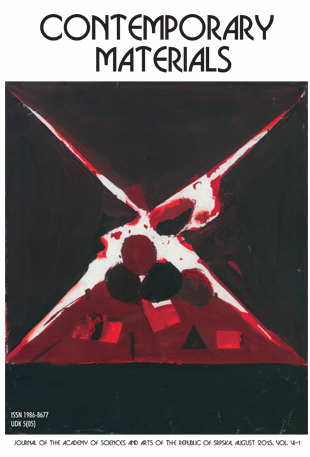TRIBOLOGICAL INVESTIGATION OF THE AUTOMOTIVE GRADE ALUMINIUM ALLOY WITH EPOXY PRIMER COATING
DOI:
https://doi.org/10.7251/COMEN2202204KAbstract
Mechanical surface preparation is a common technique for removing contaminants from surface metal layers. Unlike chemical preparation, it does not require special safety measures, including those for disposal of by-products or toxic materials, thus making it more accessible for different industries. We investigated tribological testing as the experimental method to determine the quality of the coating and the influence of the initial mechanical surface treatment. Samples were made of aluminium alloy EN AW 5083 H111 that was shot blasted with white cast aluminium with resulting surface roughness of Rz=38.908 μm. Samples were further coated with Lankwitzer EvoCor 164 2-component epoxy primer. Tribological test realised on nanotribometer is described and output parameters have been analysed: friction coefficient and penetration depth. Ball-on-flat, dry contact tribological setup was used, with 100 mN normal load, under linear reciprocating motion. Dynamic friction coefficient and penetration depth curves during one tribological test were analysed indicating the moment when the coating exhibited first failure. The test has shown that tribological tests with low loads can be used for quality testing of thin coatings, including the influence of the mechanical surface preparation on the coating adhesion.
